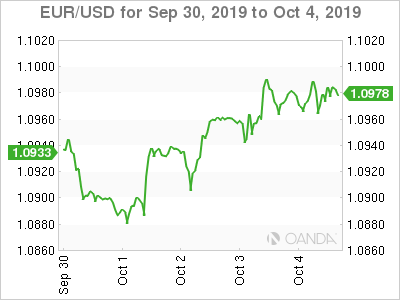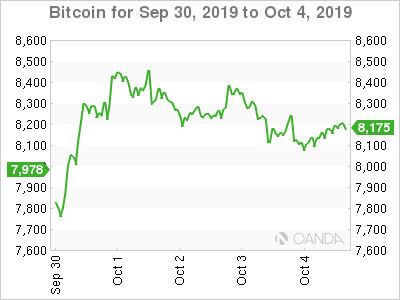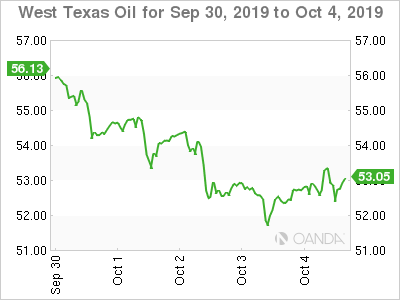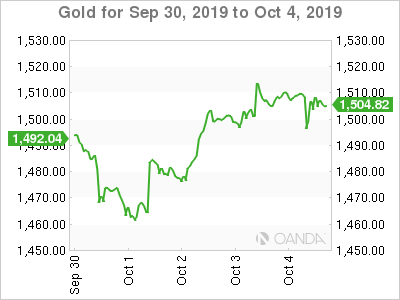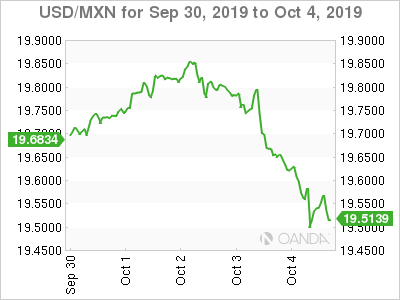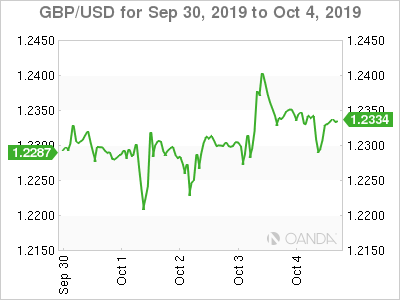The US dollar is sensitive to data misses and even though the ISM services PMI remains in expansion territory, the lower than expected index triggered a sell off of the greenback. The United States is not immune to recession fears even if it remains the developed economy with the strongest pace of growth, but the prolonged trade war with China and the ease to launch tariffs is beginning to have lasting effects on the US economy. The two PMI releases of US data this week came in lower than forecasted and will put pressure on the Fed to lower the benchmark rate when they meet at the end of the month.
The US dollar defied expectations and rose through geopolitical uncertainty at home as Democrats launched an investigation on President Trump as the US re-opened the trade war front with Europe after the WTO gave green light to tariff retaliation linked to aircraft subsidies. The signs of an economic slowdown in the US will be hard to ignore for the hawkish Fed, but it will have to concede that more stimulus is needed.
The minutes from the September FOMC meeting will be released on Wednesday, October 9 and will be full of insight into the central bank’s view on the US economy and why it remained hawkish. The stock market is rising as the PMIs are giving a strong dovish signal that could force the Fed to admit the two rate cuts this year, and more to come are not a mid-cycle adjustment but the start of an easing cycle.
Euro Advances as Data Misses Sink Dollar
The EUR/USD gained 0.37 percent in the last five trading sessions and is trading at 1.0982 ahead of the end of the week. The single currency lost ground as the US published its employment data as even with a lower than expected 130,000 jobs created in September it was still a solid number. The events of the week caught up with the dollar in the middle of the Friday session. Lower PMIs during the week, uncertainty rising in Washington ahead of the US-China trade talks and new tariffs on European goods led to the dollar depreciating against the euro.
The economic calendar for next week offers less economic indicators, but risk events will offer plenty of volatility, with China coming back online after celebrating its anniversary, Brexit and US political drama to serve as backdrop for inflation data and the minutes from the FOMC meeting
The two main drivers for the US dollar will be incremental updates in the US-China Trade War and if US economic data deteriorates even further. Early on the focus will be what will come out of the high-level trade talks. Talks resume on October 10-11 in Washington DC. We could see extreme volatility on any speculation with this latest round of talks.
A continuing trend of softer US data has market expectations surging that the Fed will deliver a third consecutive rate cut at the October 30th meeting and possibly a fourth one in December.
The Fed’s Minutes will be released on Wednesday, but we will likely see the markets more focused on Powell’s latest comments which will occur both on Tuesday and Wednesday. We will also hear from Kashkari on Tuesday, Mesters on Thursday, and Kashkari, Rosengren and Kaplan on Friday.
On Thursday the release of US inflation data will look to see if it can complicate the Fed’s job. Despite a record expansion, the US has not seen inflation rise above the Fed’s target. Hotter numbers however may help the Fed argue that they can’t go full dove.
On Friday, the confidence figures from the University of Michigan will closely be watched. A wrath of softer confidence numbers will likely cement in growing bets that the Fed will be capitulating in delivering an easing cycle. Bond yield volatility should continue and we could see that be the case for the rest of the month. If yields continue to plummet the dollar could finally see a significant reversal.
Even if we see a positive outcome from the latest round of trade talks, the Fed should still be good for a couple more rate cuts as they will look to keep the record long expansion going. Regardless of an interim trade deal, the Fed will need to deliver a stronger dovish message as business confidence will remain vulnerable and inflation is subdued.
BITCOIN
Bitcoin has settled around $8,000 after slipping below $9,000 and tumbling in the days that followed. As always, it’s difficult to pinpoint exactly what has got bitcoin traders excited but the recent sell-off highlights how sensitive and volatile it remains.
OIL
Oil prices are vulnerable to various factors, most notably at the moment global growth fears. Traders have quickly shaken off the Saudi attacks, worryingly leaving no risk-premium in the price. This may come back to bite them.
Growth fears continue to act as a drag on oil prices though although they are now trading around 2019 lows where prices have repeatedly found support. If this breaks, it could trigger a sharp decline in crude. With sentiment so fragile right now, oil is sensitive to weaker data points, particularly from the US.
It’s gone quiet on the Saudi front but further flare ups are always likely, it’s a case of when rather than if and we’ve seen what impact the attack had. Each event is more serious than the last.
GOLD
Gold has been given a lift this week by the flurry for traditional safe havens in the wake of some weak data points from the US, with both the ISM manufacturing and services numbers adding to the recession fears that have lingered over the last quarter.
This rally though came after gold finally broke below $1,480 which had held for some time and so it remains near-term bearish unless we see a break above $1,535.
Market sentiment is very fragile after this week and the jobs report on Friday may add to this. Gold, as ever, will remain sensitive to swings in sentiment.
USD/MXN MEXICAN PESO
The Mexican currency is a perfect proxy for investment into Latin America. The currency appreciated rapidly as the ISM non-manufacturing PMI disappointed and sapped the momentum away from the US dollar. The MXN erased all the loses for the week and awaits the US NFP report to confirm a trifecta of negative economic indicators. US-China trade negotiations are no hold as China celebrates its anniversary.
BREXIT
Boris Johnson’s Brexit proposal has been met with a warmer reception that any backstop alternative that we’ve seen in the past. This has given hope to the prospect of a deal but that will be extremely hard to achieve by the end of October.
There is going to need to be compromise on both sides, with the UK likely needing to compromise on the 31 October deadline.
Talks will continue but we have entered into serious negotiations, with only two weeks to go until the EU summit when all must (apparently) be signed off. These deadlines have been breached in the past though.
Sterling continues to show its sensitivity to these negotiations in both directions. If it appears that Boris is closing on a deal, significant upside lies ahead. The opposite is also likely true in the event of a no-deal and it will be extremely volatile in the interim with constant commentary appearing throughout the day.
WASHINGTON
The impeachment process will be lengthy and ultimately see President Trump remain in office. Wall Street seems to be getting more nervous that the Democratic nomination will now go to Elizabeth Warren. With Bernie Sander’s health now in question, it seems that the 78-year old senator may have to put his Presidential bid on hold.
If Elizabeth Warren becomes the favorite for becoming the next President, we could see that derail the bullish case for a much higher stock market in 2020.
Market events to watch this week:
Wednesday, October 9
- 10:30am USD Crude Oil Inventories
- 2:00pm USD FOMC Meeting Minutes
Thursday, October 10
- 4:30am GBP GDP m/m
- 4:30am GBP Manufacturing Production m/m
- 7:30am EUR ECB Monetary Policy Meeting Accounts
- 8:30am USD CPI m/m
Friday, October 11
- 8:30am CAD Employment Change
*All times EDT

